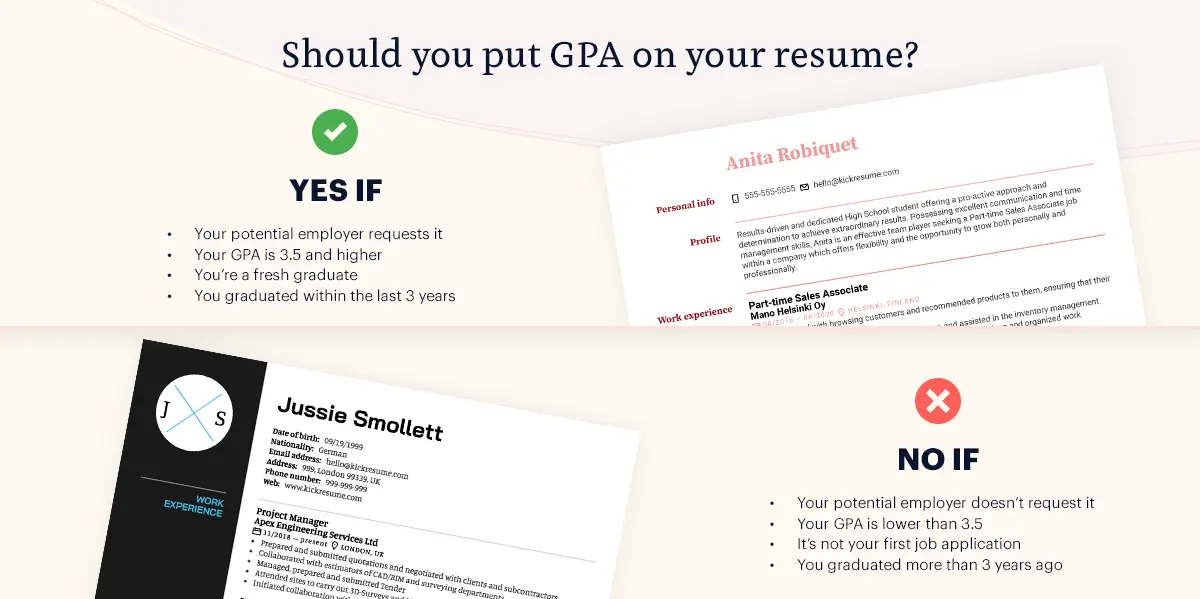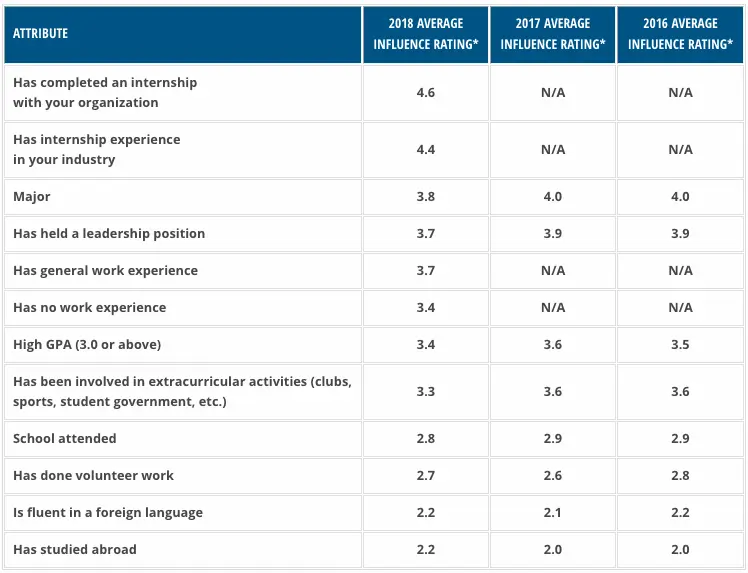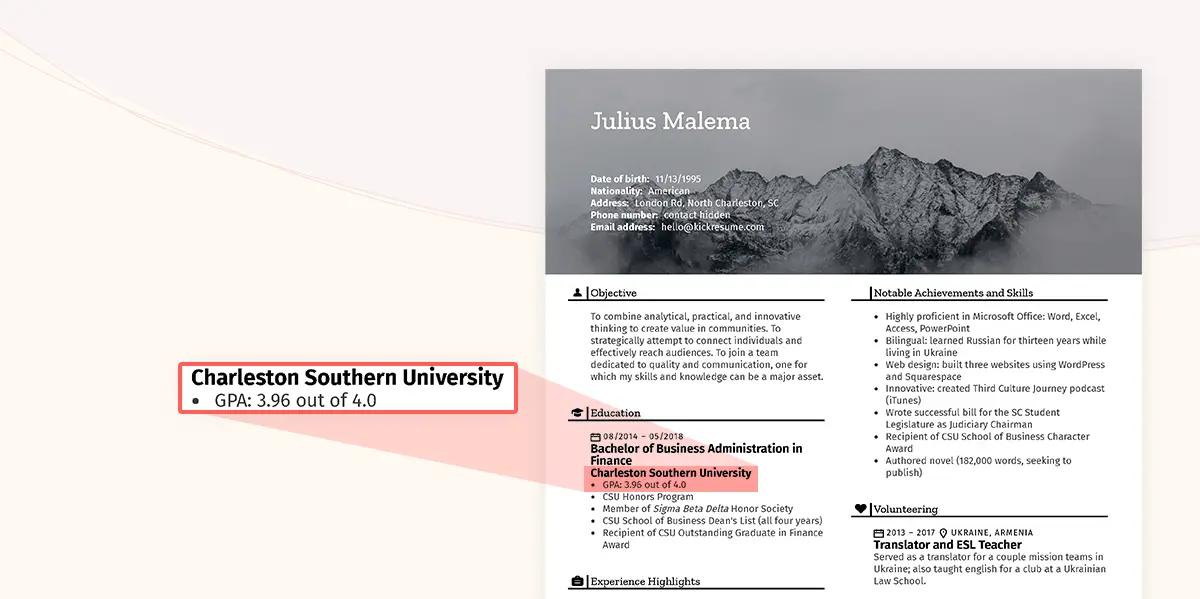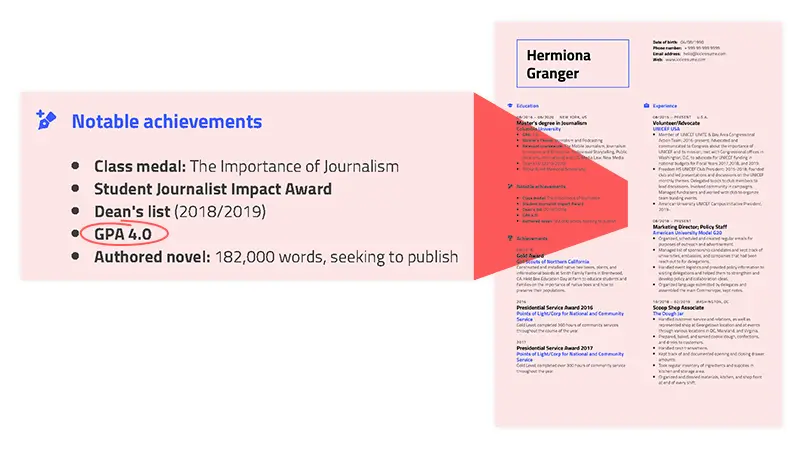To include your GPA on resume or not to include it — that is the question.
When you're in school, your GPA seems like the single most important estimate of your success. But is it really that important for your potential employer?
In order to create a killer resume you have to carefully pick which components are relevant and important enough to include in your resume.
To help you make the right decision, we’ve created a short guide to everything you need to know regarding GPA on resume!
What is a GPA?
Your GPA, which is short for Grade Point Average, is a number that evaluates how well you did during the entirety of your degree program. It’s meant to place you on a GPA scale between 1.0 and 4.0 — with 4.0 being the perfect score.
Average GPA is 2.8 , however, only a value higher than 3.5 on a 4.0 scale is impressive enough to include on your resume.
There are a few different types of GPAs, however, only two of them are relevant to your resume — Overall GPA and Major GPA.
- Overall GPA refers to the overall grade from all the courses you took in college.
- Major GPA considers only the grades you got in your declared major.
Simply pick the one that is higher. Additionally, you should go for your Major GPA when it is more relevant to the job you’re applying for.
Should you put a GPA on your resume?
The truth is that adding this component to your resume is optional. Because of that, it can be a little tricky to decide whether to include your GPA on resume or not.
In some cases yes, it can be a nice way of highlighting your good performance, however, in other cases it can actually harm your chances of getting a job.
When to include a GPA on your resume
Generally, you should include your GPA on resume if:
- Your potential employer requests GPA on resume
- You're applying for your first job
- You've been out of school for under 3 years
- Your GPA is 3.5 and higher
This goes without saying, but if an employer requests that you include a GPA in your resume, then you have to respect that no matter what score your GPA is.
If you're still in college or this is one of the first jobs you're applying for, naturally, you have little to no relevant work experience. This is when your GPA can be regarded as an indicator of your performance. But remember, only if your GPA is higher than 3.5 on a 4.0 scale.
A score lower than 3.5 is not particularly noteworthy and can actually decrease the chances of you being hired.

When not to include GPA on a resume
In some cases, including a GPA score on your resume can also be a pretty bad decision.
Avoid listing your GPA on resume if:
- Your GPA is lower than 3.5
- You've been out of school for more than 3 years
- This is not your first job application
Score lower than 3.5 is not bad, however, it's not really worth mentioning either. Many people have an average GPA, which means you won't stand out. Instead you'll blend with everyone else.
Additionally, your potential employer can regard a lower GPA as an indicator of weak work ethic.
There's a point when your GPA simply becomes less important. Trust us, you don't want to be the 36-year old still flaunting their GPA at every chance they get.
So, when you're out of school for more than 3 years or you've had a job before — relevant work experience and professional achievements matter a lot more.
Do employers check your GPA? And how important is it, really?
The truth is that many small companies don't care about your GPA, and therefore, they'll probably not check the validity of the score.
However, large companies often expect to see your GPA — In fact, 67% of companies said they screened candidates by their GPA, according to a survey.
Similarly, in 2018 when the National Association of Colleges and Employers asked employers about the influence of the attributes employers seek on a candidates resume — a high GPA was rated 3.4 on a 5-point scale, which accounts to a moderately high influence:

As you can see from the chart above, your GPA influences employers’ opinions even more than your extracurricular activities, studies abroad, or your volunteer work.
Also, in a Forbes interview with Dan Black, the director of recruiting for the Americas at Ernst & Young, he says about GPA: “It’s really one of the only indications we have of a student’s technical ability or competence to do the job.”
So, do employers check your GPA? As you can see, very often they do.
It's important to be honest, as employers normally request a copy of a student's transcript in one third of cases. After all, you don't want to be remembered for lying on your resume, do you?

How to put a GPA on you resume?
If you decide to include GPA on your resume, you need consider a few things.
Where do I list it? Should I round it up? If so, do I round up or round down? What's the difference between cumulative and overall GPA? Or should I use my major GPA instead?
Don't worry — keep on reading to get all the answers.
Where do I put my GPA on resume?
Firstly, it's important to know where to place your GPA on your resume. You have two options:
1. Education section
Put your GPA directly in your resume education section. Which should look something like this:

2. Achievements section
Alternatively, you can include your GPA in your resume achievements section. However, when you decide to opt for this option — your GPA score should be very high.

What about rounding up your GPA?
Yes, you can round up your GPA on resume. However, you should only round up to one decimal place. In some cases, you shouldn't be rounding up at all. And finally, you may even have to round down.
How many decimals should a GPA score have? The standard is one decimal place.
Here are some examples:
- 3.49 GPA would round up to 3.5
- 3.43 GPA would round down to 3.4
- 3.98 GPA would round down to 3.9 — this is because 4.0 GPA is reserved for the perfect score, which is not rounded and is truly 4.0 (consider leaving it at 3.98 in such case)
A correct rounding of a GPA on your resume is particularly important in areas such as banking, investment and finance. Learn how to make your banking resume stand out.
Cumulative GPA? Major GPA? Overall GPA?
It can seem a bit confusing. But here's a simple table of differences:
- Cumulative GPA: An average grade of a particular semester or term from one particular institute.
- Overall GPA: An average of all the cumulative GPAs.
- Major GPA: An average based on all upper division courses attempted in the major department or required by the major.
Basically, your potential employer doesn't care about the GPA you got during a particular semester or term. They care about your absolute performance which is judged on the basis of overall GPA.
Therefore, use overall GPA on your resume.
Major GPA is okay to use on your resume as well. Sometimes it's even better to use major GPA rather than overall GPA. This is either when your major GPA is higher than overall GPA or — when your major is very relevant to the job you're applying for.
Should I mention a GPA on my LinkedIn profile?
Well, basically all we've mentioned regarding GPA on resumes applies for LinkedIn as well. Do put your GPA on LinkedIn if you're still a student or you've recently graduated and your GPA is impressive — 3.5 GPA and higher on a 4.0 scale.
Don't put GPA on your resume if it's lower than 3.5 on a 4.0 scale and you have had some work experience after graduating from university. As you acquire work experience, GPA becomes less important for your potential employer.
Key takeaways
Here's everything you need to know regarding a GPA on a resume:
- Do include your GPA on resume if:
- Your potential employer requests GPA on resume
- You're applying for your first job or you've been out of school for under 3 years
- Your GPA is 3.5 and higher
- Don't include your GPA on resume if:
- Your GPA is lower than 3.5
- You've been out of school for more than 3 years
- It's not your first job application
- Large companies often expect to see your GPA because it's one of the only indications of a student's ability and performance — And yes, they do check it.
- When you decide to include your GPA in your resume, place it either in the education section or the achievement section.
- You should round up or round down your GPA score so that it only has one decimal place. Do this with caution.
- Use overall GPA or major GPA depending on which one is higher.
- You can put GPA on your LinkedIn profile too — it's optional and same rules apply.
You should carefully select which components are relevant and important enough to include in your resume in order to create a great resume. We've got you covered with these resume and cover letter guides:
Got the inside scoop on including GPA on your resume? That's a great start! Now, bring your resume game up a notch by taking inspiration from our professionally curated resume samples.




